Iran’s Oil, Gas Industry Workers Go On Strike
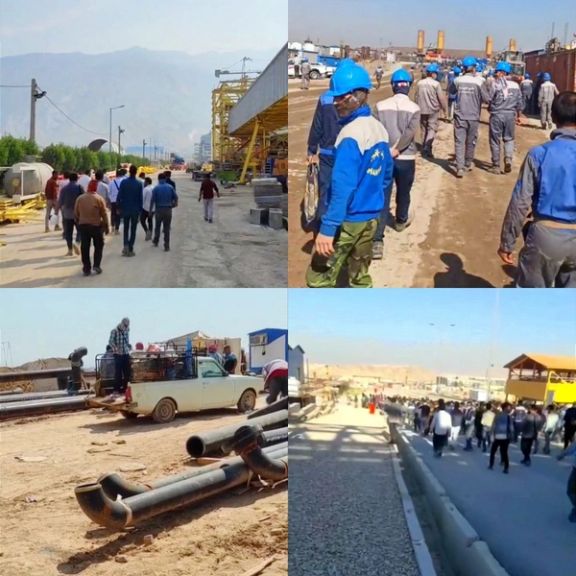
Workers of the oil, gas and petrochemical industries in Iran have gone on strike demanding wage increases in the face of more than 50 percent annual inflation.

Workers of the oil, gas and petrochemical industries in Iran have gone on strike demanding wage increases in the face of more than 50 percent annual inflation.
Countless contract workers in oil, gas, petrochemical and steel industries in the southern cities of Asaluyeh, Dehloran, Gachsaran, Kangan, etc., stopped working on Saturday demanding a raise based on their proposed list which should be 79%.
At the same time, a conference was held in the city of Cologne, Germany, to express support for trade and civil unions of Iran.
According to reports, over 80 parties and organizations as well as 1,500 activists supported the initiative by the conference.
Back in February, twenty independent trade unions and civic institutions in Iran jointly published a charter, outlining their main demands to end the current inhumane situation.
Wages for most workers are around $120-150 a month, while a family of four needs $450 for its bare minimum needs.
In a statement, they said that 44 years after the establishment of the Islamic Republic the country's economic, political and social situation has plunged into a "vortex of crisis and disintegration."
They added that no clear and attainable prospect can be envisioned to end the current situation within the existing political framework, calling for building a new, modern and humane society after the Islamic Republic.
Outlining 12 main demands, they called for the release of all political prisoners, prohibition of criminalizing political, union, and civil activities, public trial of the leaders and perpetrators of the violence against protesters, unrestricted freedom of opinion, expression and thought, assembly, and social media as well as policies to preserve natural resources and ending environmental degradation.
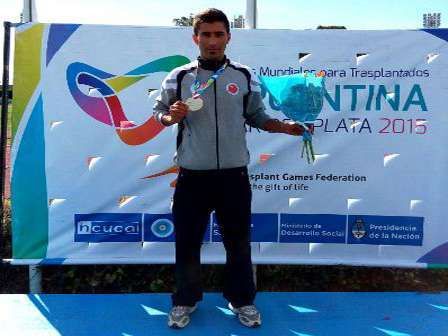
A member of Iran's National Transplant team, who had participated in the 2023 World Transplant Games, and a cross-country skier have applied for asylum abroad.
Reports received by Iran International say Saeed Montazer Parchi, who won five medals in the Transplant Games competitions held from April 15 to 21 in Australia, refused to return to Iran.
So far, he has participated in five rounds of these games, winning medals in track and field. He was also a member of the Iranian transplant national football team in the 2020 and 2022 World Cups.
Meanwhile, Sattar Seid, a cross-country skier, who represented Iran in three Winter Olympics, announced he is seeking asylum in Norway.
In a video published on Saturday, he said “Given the problems we had in the ski federation in the past year, I decided to continue my professional career in Norway."
It is not the first time Iranian athletes leave their teams during international championships and seek asylum in other countries.
About 30 Iranian athletes in recent years have defected from Iranian national teams and sought asylum in other countries, including Judo champion Saeid Mollaei, Greco-Roman national team wrestler Ali Arsalan, and many others, due to alleged threats and corruption in sports federations as well as Iran’s policy of not allowing athletes to compete against Israel. For women mandatory hijab is also an issue.
Iran is a sworn enemy of Israel, calling for its destruction and prohibits sportspeople from playing against Israeli competitors. There is no legislation banning athletes but under pressure from federation officials, they usually lose games intentionally, forfeit matches or claim injury to avoid facing Israelis.
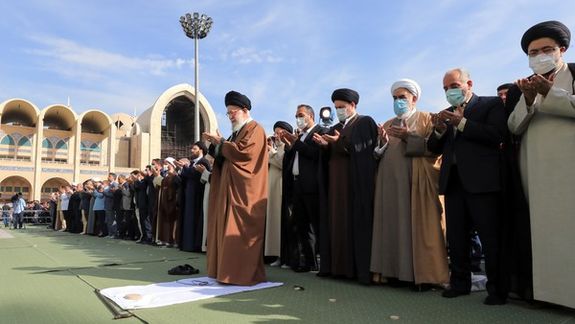
Ali Khamenei, Iran’s 83-year-old ruler, has called on the three branches of the government to cooperate, signaling differences among his hardline loyalists.
In his speech on the Muslim holiday of Eid al-Fitr Saturday, Khamenei urged the Judiciary, Executive and Legislative branches “not to obstruct one another” and not to waste time by focusing on “marginal controversies.”
Khamenei, whose regime faces serious economic and political crises, tried to sound hopeful by saying that a strong will can help overcome hurdles.
“By reinforcing our will, we can overcome the problems facing the country and if the three branches cooperate, we will not encounter difficulties,” he told officials and regime insiders who were all present in the ceremony.
As problems have become more serious for the regime, it is becoming increasingly more difficult for the governing hardliners to evade responsibility, especially for members of parliament who have little to show after three years into their term. Elections are approaching next March, and lawmakers have to answer to the people for the current economic disaster.
The national currency has halved in value since August and inflation seems uncontrollable, hovering well-above 50 percent.
As a result, some hardliners have begun criticizing President Ebrahim Raisi and threatening to impeach his ministers.
Khamenei’s call for unity and cooperation should be seen in this light and as an attempt to close ranks in the face of months of popular protests and seemingly unsurmountable problems.
The aging autocrat, ruling Iran since 1989, also asked the people not pay attention to “marginal controversies,” warning them that “enemies” want to divide the nation.
The word ‘enemy’ is a permanent fixture in Khamenei’s speeches, referring to the United States and Israel, an in some instances to European powers. It was no different in the Saturday speech when he used the term 12 times.
Having seen nationwide anti-regime protests for weeks from September to December 2022, Khamenei wants people to ignore criticism directed at the Islamic Republic and show “unity”, which for him means loyalty to the regime.
Khamenei, his top officials and the vast media propaganda machine try to portray dissent in the country as a ploy by the “enemy.” He repeated this conspiracy theory in his speech.
“The enemy is opposed to the unity of the Iranian nation…The enemy wants the people to fight each other for their different opinions and preferences,” he said calling on the people to show love and tolerance toward each other.
However, security forces under Khamenei’s command have killed more than 500 protesters since September simply for trying to express their opinions.
Khamenei also argued that “Islam’s enemies have realized that military force is not effective” and now they use other methods to dominate.
“Terror, distortion, lies, enticements…sowing pessimism among nations…are their tactics today,” Iran’s Supreme Leader said.
In a separate meeting with ambassadors from Muslim countries on the Eid occasion, Khamenei raised another favorite topic of his, by praising “the Palestinian resistance” and claiming that recent events have proven that Israel has “lost the power of deterrence.”
Serious military clashed took place earlier this month between Israel and militant forces backed by Tehran. Iranian officials have boasted of having supported these forces to create instability for Israel.
In the his address in the meeting Khamenei reiterated, “This important achievement is due the resistance of Palestinian youth, and the strategy of the Muslim world should be to help and reinforce combatants in Palestine.”
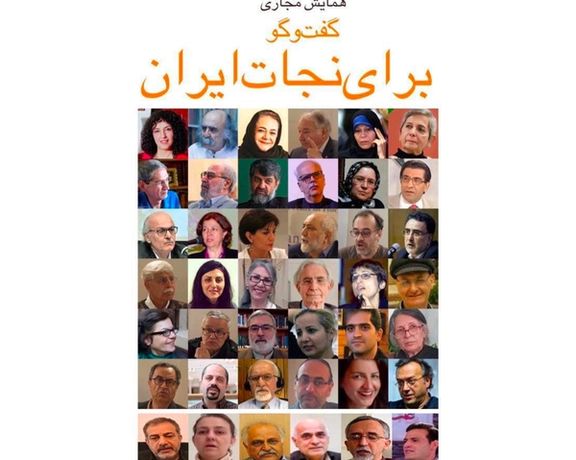
Over 40 political, social and human rights activists from inside and outside Iran for the first time attended a virtual conference called “Dialog To Save Iran”.
The meeting, which was held on Club House social media platform Friday, also heard from eight detained activists who sent messages from inside prisons in Iran.
Hashem Aghajari, a political activist and university professor referred to the last statement of the Green Movement leader Mir-Hossein Mousavi saying that with a deep understanding of the changes in Iranian society, Mousavi came to the conclusion that reform through electoral mechanisms is impossible.
Back in February, Mir-Hossein Mousavi, who was a presidential candidate in 2009 and has been under house arrest since 2011, issued a statement saying that the rulers of the Islamic Republic are not willing “to take the smallest step to meet the demands of the people.” He further added that Iran needs a “fundamental change” based on “Woman, Life, Freedom” motto and constitutional change.
Meanwhile, Mehrdad Khansari, a political activist and former diplomat, emphasized that Iran is facing a huge crisis adding that a strong front must be formed inside the country to challenge the regime.
In a message from prison, Keyvan Samimi, a journalist and political activist, who was rearrested Thursday, said Iranians inside and outside the country should form a united national front to get rid of oppression.
Imprisoned human rights activist Narges Mohammadi also said in a message that “To save Iran, we must end the tyrannical, anti-woman regime and make a peaceful and low-cost transition for the people.”
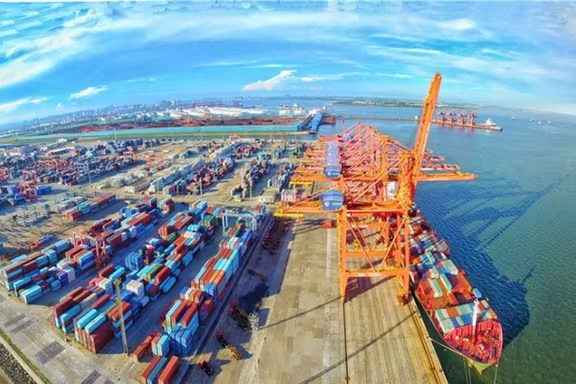
Official Chinese customs data show imports from Iran were $2.9 billion in the first quarter of 2023, which is a decline of more than 41% compared to the first quarter of 2022.
However, according to the Chinese Customs Office, China exported more than four billion dollars of goods to Iran in the mentioned period which is 52% more compared to the same period last year.
The reasons for the significant drop in Iran's exports to China are not clear, but during the past months, Iranian economic experts and businessmen had said that the Russian products are winning the Chinese market.
Earlier, Amin Ebrahimi, CEO of Iran’s Khuzestan Steel Company, stated in an interview that by supplying steel below world prices, Russia has captured the markets that Iran had created for itself during four decades of sanctions.
The figures do not include Iran's illicit oil exports to China, which are registered as cargoes from other countries by the Chinese customs. Iran ships an estimated 800,000 barrels of oil through indirect methods to China, because of US sanctions.
Meanwhile, evidence shows that Russia is taking Iran's oil market share in China as well. Hellenic Shipping News cited data from shipbroker Xclusiv in March saying that Russian crude oil imports into China have reduced the country’s intake of Iranian crude.
The report added that as a result of Chinese appetite for discounted Russian crude, Russian imports have increased sharply, but at the expense of Iranian oil shipments.
In an earlier report, Reuters cited cargo-tracking data as suggesting Chinese imports of Russian crude could hit a record in March.
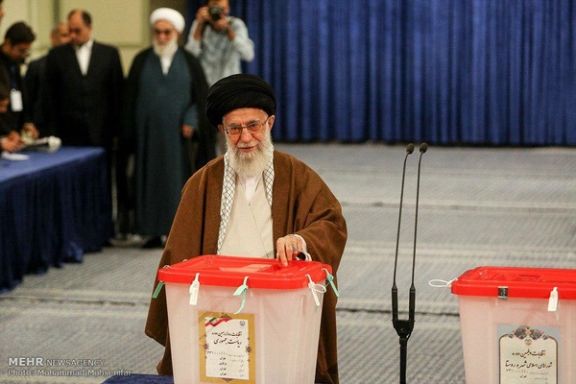
Supreme Leader Ali Khamenei’s strong disapproval of suggestions to let people decide about crucial matters through a referendum has angered many Iranians.
“[Who says] the country’s various issues can be put to referendum? Where in the world do they do that? [Who says] all the people participating in a referendum have the faculty of analyzing that matter? What kind of demand is that?” he said Tuesday at a meeting with some students.
Article 59 of the Constitution of the Islamic Republic, which was approved by a referendum after the Islamic Revolution of 1979, stipulates that in extremely important economic, political, social, and cultural matters, the functions of the legislature may be exercised through direct recourse to popular vote by holding a national referendum.
Any request for such direct recourse to public opinion must be approved by two-thirds of the members of parliament according to the Constitution.
Former President Hassan Rouhani and others have repeatedly suggested holding referendums on “important issues” in domestic and foreign policy. At a meeting with the senior officials of his government, former lawmakers, journalists and politicians on April 5, he reiterated that the answer to people’s demands in the areas of foreign and domestic policies and economy could be found by holding referendums as envisaged by the Constitution of the Islamic Republic.
Some critics such as former reformist lawmaker Mahmoud Sadeghi have argued in favor of a referendum on religious grounds. In a tweet Thursday, he reminded of the Prophet Muhammed’s defeat in the Battle of Uhud after letting the decision of a Muslim council of war prevail against his own.
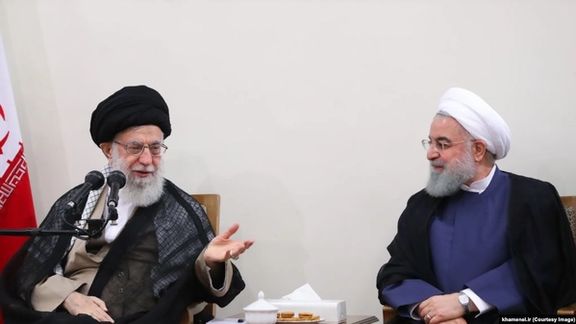
“After the defeat in Uhud War some people criticized the Prophet and asked why he had given in to the view of the majority [who do not have the power of analysis] priority over his own,” he wrote and pointed out that it was then that God sent him the famous Quranic verse 159 of Aali-Imran surah.
The Islamic Association of University Instructors, led by Sadeghi also issued a statement Friday urged Khamenei to “correct” his remark about people’s ineligibility to decide on important matters, and prepare the ground for a referendum.
Critics point out that it was through a yes-no referendum, two months after the revolution, that the new rulers of the country replaced the monarchy with an Islamic Republic. Therefore, the vote taken then also lacked legitimacy according to Khamenei’s logic, expatriate activist Shahriyar Shams tweeted.
Others have criticized Khamenei for double standards, pointing out that in a speech in June 2018 he insisted that the answer to the Israel-Palestine problem would be holding a referendum to decide the type of government in the historical country of Palestine and called it a “modern and advanced method accepted by all.”
Critics also say Khamenei’s insistence that referendum is not common in other countries is sheer fallacy and recounted the many instances including the Brexit referendum in Britain, the referendum for Scottish independence, referendum in Switzerland and Denmark over European Union laws, and the 2017 constitutional referendum in Turkey.
Hardliner loyalists find it hard, given the arguments put forth by the opposition, to defend Khamenei’s new declaration but Abdollah Ganji, the former editor of the IRGC-linked Javan newspaper who is now chief editor of Tehran municipality’s Hamshahri newspaper, in a series of tweets Wednesday said those who speak of a referendum should know that it will be “held by the [current] system itself, not against it.”
“I cannot understand the concurrent impatience of the [foreign-based] opposition and the likes of [Hassan] Rouhani for a referendum… [Suggesting referendum in] domestic or foreign policies is a kind of political-electoral trickery and fraud,” he wrote while claiming that no problems would be solved between Iran and the United States, for example, if people voted to have diplomatic relations with the US in a referendum.
For the second time since the beginning of nationwide protests in mid-September that Rouhani suggested fair and free elections and holding referendums as the only way the regime could overcome huge popular discontent within the existing political structure.